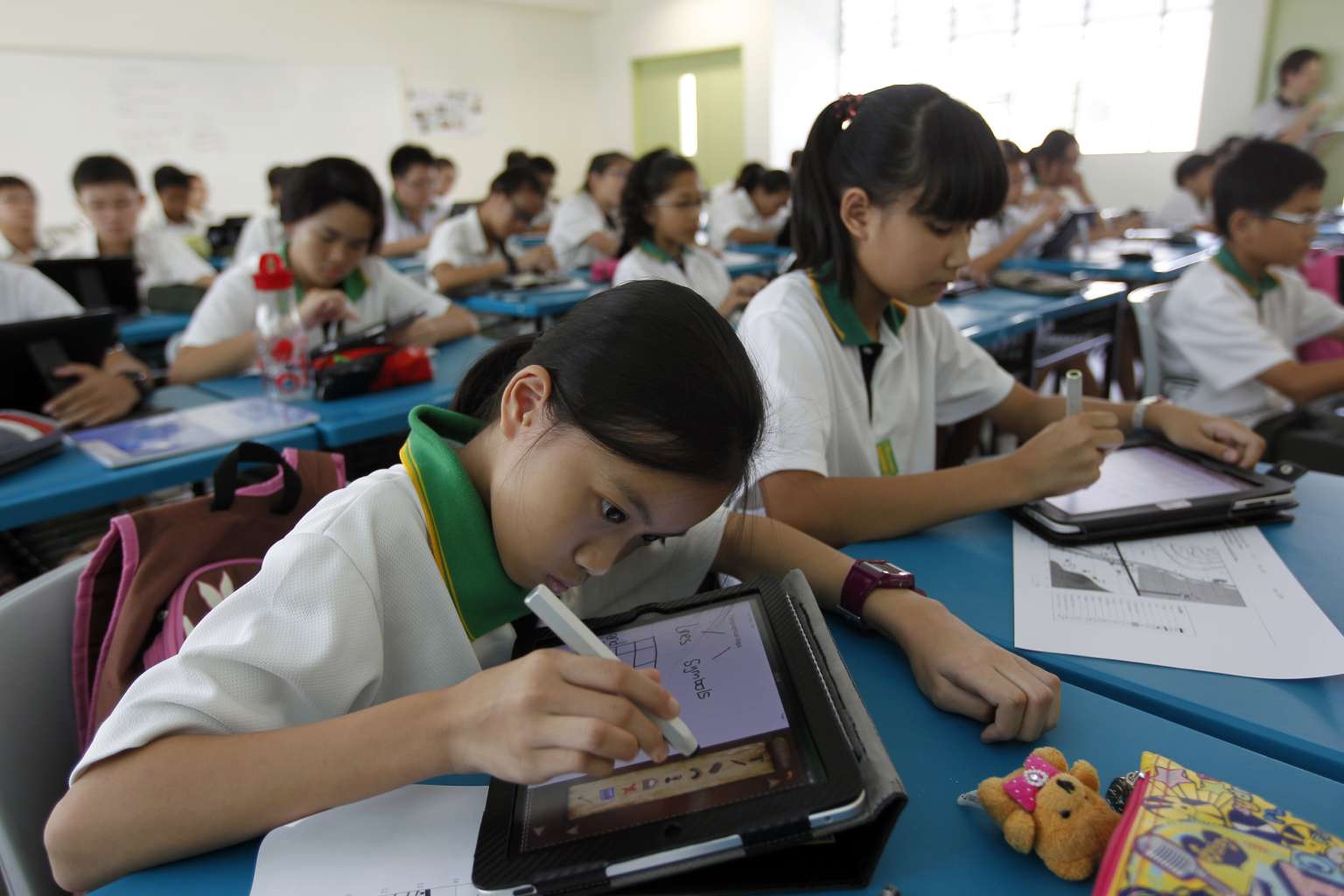Students don't perform better with tech use in school: OECD
Finding also applies to Singapore, whose top ranking in digital skills is attributed to maths and science foundation
Sign up now: Get tips on how to help your child succeed

Tampines Secondary School students working on their schoolwork with the help of iPads.
PHOTO: ST FILE
Singapore students aced global benchmarking tests conducted by the Organisation for Economic Cooperation and Development (OECD) in 2012, including the test on digital skills.
But Singapore's top-rate performance may have little to do with the use of technology in schools. Computers may harm grades instead.
The OECD released a study recently that found that computers and classroom technology do not improve student performance.
Overall, the study's results also showed "no appreciable improvements" in reading, mathematics or science in countries that invested heavily in information technology.
In fact, the frequent use of computers in school is more likely to be associated with lower marks, OECD officials said.
The study compared the use of computers and other technologies in schools to the performance of 15-year-olds in tests called the Programme for International Student Assessment (Pisa), which the OECD runs every three years.
Besides testing them on maths, science and reading, the last Pisa test in 2012 also measured students in their digital skills.
It found that students who use computers very often in school get worse results than those who use them moderately. But the latter group, who use computers in school once or twice a week, have "somewhat better learning outcomes" than those who use them rarely.
Of the seven territories that had the highest levels of Internet use in school, three - Australia, New Zealand and Sweden - were found to have "significant declines" in reading performance, while another three - Spain, Norway and Denmark - had results that had "stagnated".
The territories with the lowest levels of Internet use in school - South Korea, Shanghai, Hong Kong and Japan - are among the top performers in international tests.
OECD director for education and skills Andreas Schleicher said the results apply to Singapore as well.
"Essentially, intensity of computer use is negatively related to learning outcomes," he said.
In Singapore, students who reported that they "never or hardly ever" browse the Internet for schoolwork in school performed the best in the digital reading test.
They scored more than 30 points better than students who reported browsing the Internet in school "at least once a week".
Similarly, students who reported that computers are not used in maths classes scored the highest in the computer-based maths test.
When asked if this contradicts Singapore students' No. 1 placing for the test on digital skills, Mr Schleicher said 80 per cent of students' performance can be due to their good foundation in maths and science and not digital skills.
He said educators can read the results in two ways. "On the one hand, they underline the strong role that foundation skills play, also in shaping digital skills. On the other hand, they may suggest that schools are not using technology effectively."
Mr Schleicher warned that classroom technology can be a distraction and result in students cutting and pasting "prefabricated" homework answers from the Internet.
But he added that the findings of the report should not be used as an excuse not to use technology, but as a spur to finding a more effective approach.
He cited digital textbooks which can be updated as an example of how online technology could be better than traditional methods.
Commenting on the study, the Ministry of Education (MOE) here said it agrees with the OECD report and many other past studies that show that merely having more technology in the classroom will not improve learning outcomes.
It said its focus has been on pedagogy rather than technology alone.
An MOE spokesman said: "We have focused efforts on building the capacity of teachers, as part of their pedagogical repertoire, to use technology appropriately and meaningfully in our schools.
"Technology is a tool to help teachers design different learning experiences for the students. For example, it allows students to collaborate with one another, receive immediate feedback and make their thinking visible."
The spokesman added: "Technology is an integral part of our lives and it should be harnessed to help our students be future-ready, but our educators remain the key to effective teaching and learning."


